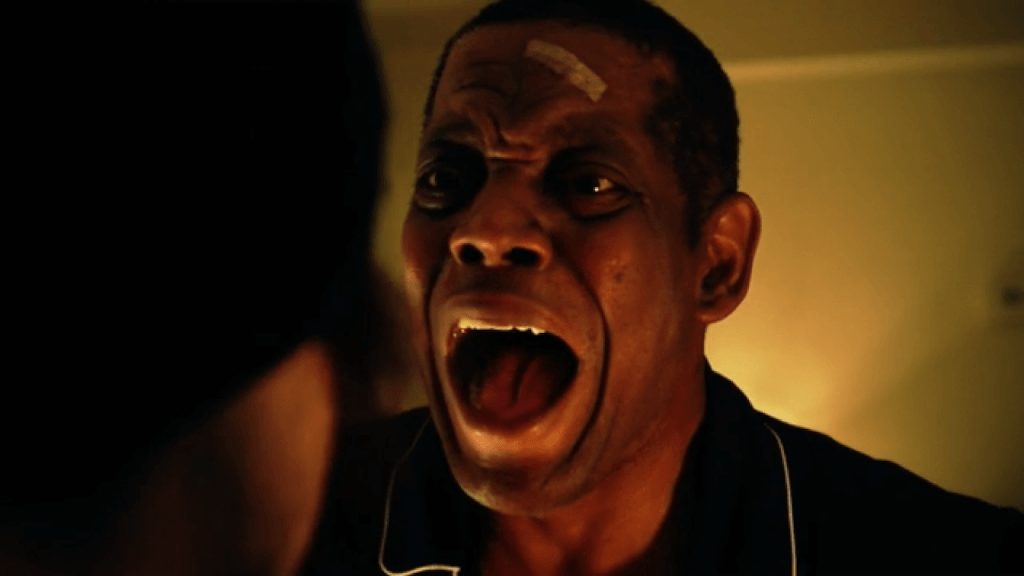Review: The Strange Thing About the Johnsons (2011)
I don’t usually write about short films, but as a diehard Ari Aster fan, I felt the need to review his first and most controversial project, The Strange Thing About the Johnsons (2011). While Ari Aster gained mainstream fame with his two horror masterpieces, Hereditary (2018) and Midsommar (2019), it was The Strange Thing About the Johnsons that established his penchant for the bizarre and unspeakable.
“Unspeakable” is probably a word that applies best to this 30-minute familial horror film. Aster claims that the idea for the film came about while discussing things that you simply could not show in a film. The challenge of showing the unshowable and speaking the unspeakable pushed Ari Aster to submit The Strange Thing About the Johnsons as his thesis film at the American Film Institute. It has since gone on to draw a lot of attention and controversy online.
The Strange Thing About the Johnsons opens on a scene of a young teenage boy, Isaiah, masturbating. His father, Sidney Johnson (Billy Mayo), walks into the room. While Isaiah is naturally embarrassed and wants his father to leave, his father reassures him that it’s completely normal and there’s nothing to be ashamed of. As Sidney leaves the room, the camera pans to reveal that Isaiah was masturbating to a picture of his father.
The film fast-forwards 14 years to the day of Isaiah’s wedding. When Isaiah’s mother, Joan (Angela Bullock), starts looking for Isaiah, she finds him performing fellatio on his father, who grimaces and appears highly distressed. Though Joan doesn’t speak of what she saw, Sidney attempts to communicate with her by way of a book.
Sidney leaves a manuscript entitled Cocoon Man: Confessions by Sidney Johnson under Joan’s pillow, only to have Isaiah discover it first. The manuscript chronicles the years of sexual abuse Sidney has faced at the hands of his own son. Over the years, he could never fully address the issue or reveal it to Joan. The manuscript is his way to finally tell his story and reveal his tortured life to his wife and the world. Sidney’s book infuriates Isaiah, leading to a series of violent events that tear the Johnson family apart.
It’s easy to see why many viewers find The Strange Thing About the Johnsons so controversial. It addresses what cannot be addressed: a father who is sexually abused by his own son. Moreover, Aster focused his story on an African-American family, which many found to be offensive in its own right. Nonetheless, despite being just short of 30 minutes long, The Strange Thing About the Johnsons is a very uncomfortable watch from start to finish.

To be clear, the film never feels pornographic; at least, not through its intention. Ari Aster gives us just enough information and visual cues to induce disgust, but not enough to be explicit. It is this balance that makes The Strange Thing About the Johnsons so mesmerizing. We recoil from what we see on-screen, yet we can’t look away.
While The Strange Thing About the Johnsons is one of the best short films I’ve seen in a while, it is not without fault. I firmly believe that you cannot fault the film for being overly controversial, as that was Aster’s intention from the start. However, it falls short in the same way that many student films do.
» You Might Like: Trainspotting and the Dilemma of Scottish National Identity
The acting, though generally good, occasionally falls flat. Isaiah’s character is particularly difficult to convey, even if he were portrayed by a veteran actor. In scenes in which adult Isaiah (Brandon Greenhouse) confronts his family members, the cracks begin to show.
On the other hand, both Bill Mayo and Angela Bullock do an excellent job portraying parents caught in an impossible situation. Joan is a mother who wants to act as though the past 14 years never happened, while Sidney is a tortured father whose only hope for salvation is his own story.
From a technical standpoint, The Strange Thing About the Johnsons also does about as well as any other student film. That said, Ari Aster shows a command for storytelling that many other amateur filmmakers simply do not possess. He understands that the camera is there to show images, but that images do not a great film make.
It is the empty space between these images in which the audience exists. Incest is at the heart of the story, but it is put in the minds of the viewers through sound and implication more than anything else. We are shown more than enough to understand, but we are never shown more than is necessary. The story flows seamlessly without the need for endless dialogue. These quiet, empty spaces lead us to a climactic ending that is both tragic and horrifying.

Since his debut film, Ari Aster has dialed back his penchant for controversy. This enabled his films to reach and be palatable to mainstream audiences. But the horror that lies just under the surface is always there. Aster has a knack for extrapolating the issues we can’t talk about, even in his mainstream films; and for that, I will continue to sing his praises.
There are plenty of films about incest out there. However, few of them deal with the subject matter in a way that is repulsive without being reprehensible. You never feel as though Ari Aster has ill intentions; nor do you feel that he wants to punish his audience. Instead, Aster treats the subject with complete reverence. All of the cards are on the table, leaving the audience to directly confront an issue that most would rather sweep under the rug.
In this way, we are all Isaiah’s mother. We want the story to be over, or to simply never have happened at all. When it comes to incest, we would prefer to be revisionist historians. You may look at a film like The Strange Thing About the Johnsons and think that it’s grotesque, revolting, or unwatchable, and you’d be right.
But it’s also a necessary film. We should never sweep sexual abuse under the rug. If we can’t confront issues like incestuous relationships and sexual abuse in a fictional movie, there’s no way we can confront them in real life. In that way, I find The Strange Thing About the Johnsons to be far more than an attempt to push the envelope. It takes us what we need to see, even if we’d rather keep our eyes shut.
Rating: ★★★★ out of 5
If you’d like to watch The Strange Thing About the Johnsons (2011), it is currently available to watch on Youtube.
For more film reviews like this one, check out the Philosophy in Film Homepage!


Pingback: The Strange Thing About the Johnsons (Ari Aster – 2011) – PANTERA CINE